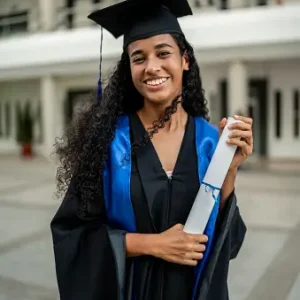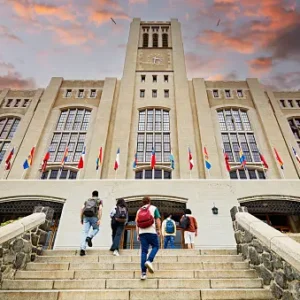The Columbia Journalism School, located in New York City, stands as one of the preeminent institutions for journalism education worldwide. Its master’s programs are renowned for producing journalists who excel in various media landscapes, from traditional newspapers and television to cutting-edge digital platforms. Recognizing the financial challenges faced by many aspiring journalists, Columbia Journalism School offers a variety of funded master scholarships aimed at attracting diverse, talented individuals who are passionate about pursuing a career in journalism.
These scholarships not only alleviate the financial burden associated with advanced education but also provide recipients with unparalleled opportunities to network with industry leaders, engage in groundbreaking research, and develop the critical skills needed for success in journalism. Among the notable scholarships available are the Knight-Bagehot Fellowship, which focuses on business and economics journalism; the Toni Stabile Fellowship, dedicated to investigative journalism; and the Spencer Fellowship, which supports long-form narrative journalism projects. Each of these scholarships targets different areas of journalism, allowing students to specialize and excel in their chosen fields.
Eligibility for these scholarships varies, with general requirements including a strong academic record, professional experience, and a demonstrated commitment to journalism. Some scholarships may have additional criteria, such as a focus on specific types of reporting or particular demographic groups, ensuring a diverse and inclusive cohort of scholars.
The application process is rigorous, typically requiring a detailed personal statement, professional portfolio, letters of recommendation, and sometimes an interview. Successful candidates are selected based on their academic achievements, professional accomplishments, and potential to contribute meaningfully to the field of journalism.
Recipients of these scholarships benefit not only from financial support but also from the prestige associated with being affiliated with Columbia Journalism School. They gain access to a robust alumni network, mentorship opportunities, and the chance to participate in exclusive workshops and seminars. These experiences enrich their educational journey and significantly enhance their career prospects.
The funded master scholarships at Columbia Journalism School offer an invaluable opportunity for aspiring journalists to receive world-class education and training without the financial strain. These scholarships play a crucial role in nurturing the next generation of journalists, ensuring they are well-equipped to uphold the standards of the profession and navigate the evolving media landscape. Aspiring journalists are encouraged to apply and take advantage of the transformative opportunities these scholarships provide.
Types of Funded Master Scholarships Available
Knight-Bagehot Fellowship
The Knight-Bagehot Fellowship at Columbia Journalism School is one of the most prestigious and sought-after scholarships for mid-career journalists who have a keen interest in business and economics journalism. Established in 1975, the fellowship aims to enhance journalists’ understanding of business, economics, finance, and technology, equipping them with the knowledge and skills necessary to report on these complex topics with depth and accuracy.
The Knight-Bagehot Fellowship offers a comprehensive, full-time academic year of study at Columbia University. Fellows enroll in graduate-level courses at Columbia’s Graduate School of Journalism, as well as at Columbia Business School, Law School, and the School of International and Public Affairs (SIPA). This interdisciplinary approach allows fellows to gain a well-rounded education, providing them with a robust foundation in various aspects of business and economics. Courses may cover topics such as financial accounting, corporate finance, microeconomics, and global economic issues, among others.
Eligibility for the Knight-Bagehot Fellowship is open to journalists from around the world who have at least four years of experience in journalism. Applicants are typically required to demonstrate a strong interest in business and economics reporting and show a track record of professional achievements in these areas. The fellowship is highly competitive, attracting applicants who are already accomplished in their careers and seeking to deepen their expertise and expand their professional horizons.
The application process for the Knight-Bagehot Fellowship includes submitting a detailed personal statement, work samples, a professional resume, and letters of recommendation. Candidates may also be required to undergo an interview as part of the selection process. The selection committee looks for candidates who exhibit a strong commitment to journalism, a desire to enhance their understanding of business and economics, and the potential to make significant contributions to the field.
One of the unique aspects of the Knight-Bagehot Fellowship is the opportunity for fellows to engage with leading professionals and academics in the field. They have access to Columbia’s extensive resources, including its libraries, research centers, and networks. Additionally, fellows participate in special seminars and workshops designed specifically for them, covering current issues and trends in business journalism.
Upon completion of the fellowship, Knight-Bagehot alumni join an elite group of journalists who have gone on to hold prominent positions in media organizations around the world. The fellowship not only provides financial support but also offers invaluable professional development opportunities, helping journalists to produce more insightful and impactful business and economics reporting.
In conclusion, the Knight-Bagehot Fellowship at Columbia Journalism School represents a significant investment in the future of business journalism. It offers mid-career journalists a unique opportunity to deepen their knowledge, broaden their skills, and enhance their careers through rigorous academic study and professional engagement. Aspiring business journalists are encouraged to apply for this transformative fellowship, which continues to shape the field of business journalism globally.
Toni Stabile Fellowship
The Toni Stabile Fellowship at Columbia Journalism School is dedicated to fostering excellence in investigative journalism. Named after Toni Stabile, an acclaimed journalist and author, the fellowship aims to support aspiring investigative reporters by providing them with the financial resources, mentorship, and educational opportunities needed to pursue in-depth, impactful journalism.
The Toni Stabile Fellowship is offered to students enrolled in the Master of Science program with a concentration in investigative journalism. This fellowship provides a comprehensive package that includes tuition assistance, living stipends, and funds for research expenses. This financial support allows fellows to fully immerse themselves in their studies and investigative projects without the burden of financial constraints.
Eligibility for the Toni Stabile Fellowship is open to both domestic and international students who have demonstrated a strong commitment to investigative journalism. Applicants are typically required to showcase their previous work in the field, highlighting their ability to uncover and report on significant issues. A strong academic record and professional recommendations further strengthen an application.
The application process involves submitting a detailed personal statement, work samples, a resume, and letters of recommendation. The selection committee looks for candidates who exhibit a passion for investigative journalism, a track record of producing impactful stories, and the potential to contribute meaningfully to the field.
During the fellowship, students benefit from Columbia’s robust journalism curriculum, which includes courses in investigative techniques, data journalism, and multimedia storytelling. They also have the opportunity to work closely with faculty members who are experienced investigative journalists, gaining valuable insights and mentorship.
Graduates of the Toni Stabile Fellowship have gone on to produce award-winning investigative work, uncovering corruption, exposing injustices, and bringing critical issues to light. The fellowship not only provides financial support but also nurtures the skills and networks necessary for a successful career in investigative journalism.
The Toni Stabile Fellowship at Columbia Journalism School empowers emerging investigative journalists to pursue their passion for uncovering the truth. It provides essential financial and educational support, helping fellows to develop the expertise and resilience needed to tackle complex stories and make a lasting impact in the field of journalism.
Spencer Fellowship
The Spencer Fellowship at Columbia Journalism School is a prestigious program designed to support journalists who focus on education reporting. Named after the Spencer Foundation, which funds the fellowship, this program aims to enhance the quality and depth of education journalism by providing journalists with the resources and academic environment to pursue significant projects.
The Spencer Fellowship offers mid-career journalists a full academic year to engage in research and develop their reporting skills. Fellows are provided with a generous stipend, tuition for relevant courses at Columbia University, and additional funds for research expenses. This financial support allows fellows to fully concentrate on their investigative projects without the distraction of financial worries.
Eligibility for the Spencer Fellowship is open to journalists with at least five years of professional experience in education reporting. Applicants should demonstrate a commitment to the field and a track record of producing insightful and impactful stories. The fellowship seeks candidates who are passionate about improving education through rigorous and compelling journalism.
The application process for the Spencer Fellowship includes submitting a detailed project proposal, a professional resume, work samples, and letters of recommendation. The selection committee looks for candidates who propose innovative and important projects that have the potential to influence public understanding and policy in education.
During the fellowship, Spencer Fellows benefit from Columbia’s rich academic resources and interdisciplinary approach. They have the opportunity to take courses across various departments, including the Graduate School of Journalism, Teachers College, and other relevant schools within the university. Fellows also engage with leading scholars and practitioners in the field of education, gaining valuable insights and building professional networks.
Graduates of the Spencer Fellowship have produced groundbreaking work that has influenced education policy and practice. Their projects often lead to significant societal impacts, shedding light on critical issues such as educational inequality, policy reform, and innovative teaching methods.
The Spencer Fellowship at Columbia Journalism School empowers journalists to produce high-quality education reporting. It provides essential financial support, academic resources, and professional development opportunities, enabling fellows to undertake ambitious projects that contribute to the public’s understanding of education and drive positive change in the field.
In addition to the Knight-Bagehot, Toni Stabile, and Spencer Fellowships, Columbia Journalism School offers a variety of other funded master scholarships designed to support students with diverse interests and backgrounds in journalism. These scholarships aim to reduce financial barriers and foster a more inclusive and dynamic community of future journalists.
One such scholarship is the Robert Wood Johnson Foundation (RWJF) Fellowship in Health Journalism. This fellowship is tailored for journalists interested in covering health and healthcare issues. It provides recipients with a full tuition waiver and a generous stipend to support their living expenses during their studies. RWJF Fellows engage in specialized coursework and hands-on projects that deepen their understanding of public health, health policy, and medical science. This fellowship is ideal for journalists who aim to produce in-depth reporting on health-related topics, contributing to a more informed public discourse on critical health issues.
Another notable scholarship is the Investigative Reporting Resource Center Fellowship. This fellowship is designed to support students who are passionate about investigative journalism but may not fit into the specific criteria of other fellowships like the Toni Stabile Fellowship. Recipients of this fellowship receive funding to cover tuition and living expenses, enabling them to pursue complex investigative projects. The Investigative Reporting Resource Center Fellowship emphasizes the development of advanced investigative techniques, including data journalism, document analysis, and in-depth interviewing skills.
The Dean’s Scholarships are another significant source of financial aid at Columbia Journalism School. These merit-based scholarships are awarded to students who have demonstrated outstanding academic achievements and professional potential. Dean’s Scholars receive substantial financial support, which can include full or partial tuition coverage, and sometimes additional stipends for living expenses. These scholarships recognize and reward excellence, encouraging students to reach their full potential in their journalistic endeavors.
For students interested in political reporting, the Lipman Center Fellowship offers a unique opportunity. This fellowship is named after Toni Stabile’s daughter, Harriet Lipman, and focuses on enhancing the coverage of political and social justice issues. The fellowship provides financial support and access to specialized seminars and workshops, where fellows can engage with leading political reporters and scholars. This experience equips them with the skills and knowledge needed to produce insightful and impactful political journalism.
Additionally, Columbia Journalism School offers several need-based scholarships to ensure that financial limitations do not hinder talented students from pursuing their education. These scholarships consider the financial circumstances of applicants and provide varying levels of support to help cover tuition and living expenses.
In summary, Columbia Journalism School’s diverse range of funded master scholarships reflects its commitment to supporting the next generation of journalists. Whether through specialized fellowships like the RWJF Fellowship in Health Journalism, merit-based Dean’s Scholarships, or need-based financial aid, the school offers robust support to help students from all backgrounds achieve their educational and professional goals. These scholarships not only alleviate financial burdens but also provide unique opportunities for professional growth and development, ensuring that graduates are well-prepared to contribute meaningfully to the field of journalism.
Eligibility Criteria
Eligibility criteria for the funded master scholarships at Columbia Journalism School vary based on the type of scholarship but generally include a mix of academic achievements, professional experience, and specific interests in journalism. These criteria ensure that the most talented and dedicated individuals are selected to benefit from the financial support and opportunities provided by these prestigious scholarships.
General Requirements
All applicants to Columbia Journalism School’s funded master scholarships must meet certain general criteria. Typically, applicants must have a bachelor’s degree from an accredited institution. A strong academic record is essential, as is a demonstrated commitment to a career in journalism. Applicants are often required to submit a detailed personal statement outlining their career goals and reasons for pursuing a master’s degree at Columbia. Additionally, work samples that showcase their journalistic skills and achievements are usually required. Letters of recommendation from professionals in the field or academic mentors who can attest to the applicant’s abilities and potential are also critical components of the application process.
Specific Requirements for Each Scholarship
Each scholarship has its own specific requirements that reflect its focus and goals. For instance:
- Knight-Bagehot Fellowship: Applicants must have at least four years of professional experience in business or economics journalism. The fellowship seeks candidates who have demonstrated a strong interest and aptitude in these areas.
- Toni Stabile Fellowship: This fellowship targets students with a concentration in investigative journalism. Applicants should have a track record of producing investigative work and must showcase their ability to uncover and report on significant issues.
- Spencer Fellowship: Geared towards education reporters, applicants need at least five years of professional experience in education journalism. A project proposal outlining a significant investigative or explanatory project in education is a key part of the application.
- Robert Wood Johnson Foundation Fellowship: Applicants must demonstrate a strong interest in health journalism and have experience reporting on health and healthcare issues.
Each fellowship may also require additional specific documents, such as a project proposal, evidence of professional experience, or specialized work samples relevant to the fellowship’s focus.
Additional Criteria for International Students
International students are encouraged to apply for these scholarships and bring a diverse range of perspectives to Columbia Journalism School. However, they must meet some additional criteria. Proficiency in English is essential, and non-native speakers are usually required to provide TOEFL or IELTS scores. International applicants must also navigate visa requirements, which can involve demonstrating financial stability to cover living expenses, even if much of their tuition is funded by scholarships. Furthermore, some scholarships may have specific provisions or additional support mechanisms for international students to help them adjust to studying in the United States.
In summary, while the eligibility criteria for Columbia Journalism School’s funded master scholarships are rigorous, they are designed to identify and support individuals who are most likely to excel in their journalism careers. General requirements ensure a high standard of applicants, specific requirements align candidates with the fellowship’s focus, and additional criteria for international students ensure a diverse and capable cohort of future journalists.
Application Process
The application process for funded master scholarships at Columbia Journalism School is comprehensive and designed to select candidates who demonstrate exceptional talent, dedication, and potential in journalism. Understanding the steps to apply, the required documents and materials, and the important deadlines is crucial for prospective applicants to successfully navigate the process.
Steps to Apply for Scholarships
1. Research Scholarships: The first step is to thoroughly research the available scholarships to determine which ones align with your background, interests, and career goals. Each scholarship has specific criteria and focus areas, so it’s essential to identify the ones that best suit your qualifications.
2. Prepare Your Application: Begin by creating an account on Columbia Journalism School’s online application portal. Complete the general application for admission to the Master of Science program, as most scholarships require you to be admitted to the program.
3. Indicate Scholarship Interest: During the application process, there will be sections where you can indicate your interest in specific scholarships. Make sure to clearly state which scholarships you are applying for and why you are a suitable candidate for each.
4. Submit Required Documents: Gather and submit all required documents and materials. This includes personal statements, work samples, letters of recommendation, and other supporting documents specific to each scholarship.
5. Application Review: After submission, your application will be reviewed by the admissions committee and the specific scholarship committees. This may include interviews or additional evaluations based on the scholarship requirements.
6. Notification of Decision: Successful applicants will be notified of their admission to the program and their scholarship awards. This typically includes details on the financial aid package and any next steps required.
Required Documents and Materials
1. Personal Statement: A detailed personal statement explaining your background, career goals, and reasons for pursuing a master’s degree at Columbia Journalism School. It should also address why you are a suitable candidate for the specific scholarship(s) you are applying for.
2. Resume/CV: An updated resume or CV that outlines your academic achievements, professional experience, skills, and any relevant extracurricular activities.
3. Work Samples: Samples of your journalistic work that demonstrate your skills, experience, and the quality of your reporting. These should be relevant to the type of journalism the scholarship focuses on (e.g., business journalism for the Knight-Bagehot Fellowship).
4. Letters of Recommendation: Typically, two to three letters of recommendation from professors, employers, or professional colleagues who can attest to your abilities, character, and potential as a journalist.
5. Academic Transcripts: Official transcripts from all post-secondary institutions you have attended. These should reflect your academic performance and any relevant coursework.
6. Project Proposal: For certain scholarships, such as the Spencer Fellowship, you may need to submit a detailed project proposal outlining the investigative or reporting project you plan to undertake during your studies.
7. English Proficiency Scores: For international applicants, proof of English proficiency through TOEFL or IELTS scores if English is not your first language.
Important Deadlines
- Application Deadline: The application deadline for admission to Columbia Journalism School and for scholarship consideration typically falls in early to mid-January for the following academic year. Exact dates can vary, so it’s important to check the school’s website for the most current information.
- Supplementary Materials Deadline: All required documents and materials must be submitted by the specified deadline, which is usually the same as the general application deadline. Ensure all parts of your application are complete to avoid any delays.
- Interview Dates: If interviews are part of the selection process, they are usually conducted a few weeks after the application deadline. Be prepared for potential interviews and check your email regularly for notifications.
- Notification of Decision: Admissions and scholarship decisions are typically communicated by late March or early April. This notification will include details about your acceptance, any scholarship awards, and instructions for next steps.
In conclusion, the application process for funded master scholarships at Columbia Journalism School involves several critical steps, including thorough research, meticulous preparation of required documents, and adherence to important deadlines. By following these guidelines and ensuring all materials are complete and submitted on time, applicants can maximize their chances of receiving financial support to pursue their journalism education at one of the world’s leading institutions.





